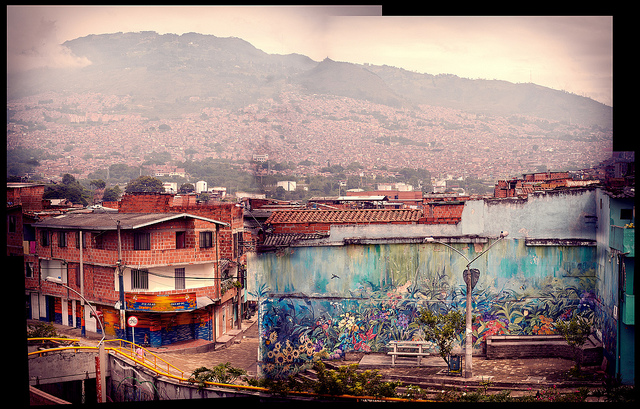In the thriving city of Medellín, Colombia, project Hiperbarrio [es] (a Rising Voices grantee) and several more interesting initiatives are in development, focusing on social inclusion and citizen media training. One of the new projects is El Puente_lab [es], a production platform for art and culture. They define their objectives as [es]:
desarrollar proyectos culturales en el ámbito local, creando puentes de comunicación con artistas y expertos a través una infraestructura operativa de cooperación internacional.
Los proyectos que desarrolla el puente_lab responden a necesidades especificas del contexto social donde se realizan, utilizando la creatividad artística como instrumento de activación de dinámicas culturales que inicien, faciliten y/o acompañen procesos de educación, comunicación y transformación urbana y social.
The projects developed by el puente_lab meet the specific needs of the social context where they are carried out, using artistic creativity as a tool of activation of cultural projects that initiate, facilitate and/or accompany processes of education, communication and urban and social transformation.
Among their projects is Proyecto Espacios de Memoria (memory spaces) [es]: “artistic interventions in the public space of the Moravia neighborhood in Medellín. These interventions will serve to communicate to Moravia's inhabitants at first place and to the public in general, the importance of the neighborhood’s urban and social development and urban transformation during the past years”; and Nodos de Desarrollo Cultural (cultural development nodes) [es], that tries to “tackle the lack of cultural spaces in a marginalized densely populated neighborhood, and in addition, work under the condition of a low budget, using recycled materials and strict conditions of use of public space.”
Moravia is a neighborhood in northeast Medellín sharing a common story with other neighborhoods in Latin America. As this article [es] explains:
During the 70s and 80s, [Medellín] received a tidal wave of provincial, rural displaced Colombians that settled in a haphazard manner, setting up shacks on top of a landfill next to the bus station. This encampment received the name ‘El Morro de Moravia’ (Hill of Moravia). […] [Later] a complete intervention project began that involved different action stages: relocation of inhabitants, decontamination and recovery of Morro as a public space.
The blog G4Moravia reports [es] additional characteristics of this neighborhood:
Moravia y su área cercana son hogar de miles de familias que surgieron con el crecimiento de Medellín, principalmente con el auge de las grandes empresas manufactureras y de construcción. También ha sido la puerta de otros grupos familiares que llegaron principalmente desde el norte y el Urabá antioqueños, los departamentos de Córdoba y Chocó y que encontraron alternativas de subsistencia en la economía formal e informal de la ciudad. […] Por la manera como se urbanizó, Moravia es un sistema urbano de configuración cerrada, que propicia el “desarrollo hacia adentro” de la vida comunitaria de sus habitantes, presenta una malla urbana laberíntica y poco permeable desde y hacia la ciudad.
In this environment the projects of El Puente_lab have been developed. Daniel Urrea [es], one of the members of the Puente_lab group, spoke with Global Voices about what Puente_lab is doing currently:
Given that this video dates from April, the date of the project mentioned by Daniel working with girls from Moravia is currently nearing completion. The blog Moravia Video_Lab [es] has information and news on the workshops and what has been accomplished so far. In their About us [es], they state:
El proyecto pretende capacitar en video a un grupo de 20 mujeres del barrio Moravia a través de talleres que tendrán lugar entre el 16 de Agosto y la primera semana de Septiembre, liderados por las artistas María Rosa Jijón y Margarita Vázquez Ponte […] Será un proceso en el que chicas entre los 12 y los 17 años aprenderán a registrar y editar video, pero además será un espacio para reflexionar en torno a su rol como mujeres.
You can also visit their Flickr site and Vimeo video channel, where 10 videos from the workshops are already uploaded, including this one:
Finally, Margarita Vázquez Ponte, the visual artist and one of the facilitators of the training classes, wrote on her blog [es] about her experiences in Medellín and the workshops. In one post [es] she relates her impressions from the final socialization session of the project:
Bueno, ¿qué puedo decir? todo, el taller, la presentación, fue como que un éxito, las chicas eran una mezcla de turbación y orgullo de ver sus trabajos en público y en pantalla grande, creo que fue empoderador para ellas ver cuánto podían hacer en tan poco tiempo. Todas recibieron certificados por su trabajo. ¿Qué nos piden ahora? Están dispuestas a hacer más… lo que es excelente y espero suceda…
Global Voices Author Catalina Restrepo supported the El Puente_lab workshops in Moravia and helped compile much of the information in this post.
The image used in this post is a photo composition from Flickr user Archivo_vivo used under the license CC BY-SA 2.0.
Beatriz Arze helped subtitle the videos in this post.








1 comment